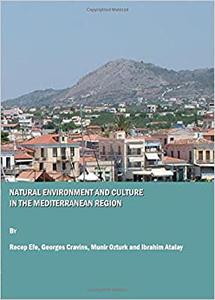
Georges Cravins, Munir Ozturk and Ibrahim Atalay, "Natural Environment and Culture in the Mediterranean Region"
English | 2008 | ISBN: 1847186580 | PDF | pages: 509 | 10.5 mb
The largest of the world's five Mediterranean-climate regions and one of the largest archipelagos in the world, the Mediterranean Basin is located at the intersection of two major landmasses, Eurasia and Africa, which contributes to its cultural and high biodiversity. Although much of the hotspot was once covered by a dense cover of forests, the Basin has experienced intensive human development and impact on its ecosystems for at least 8000 years, significantly longer than any other hotspot. The greatest impacts have been deforestation, habitat fragmentation, intensive grazing and fires, and infrastructure development, especially on the coast, which have distinctly altered the landscape. The agricultural lands, evergreen woodlands and maquis habitats dominating the basin are the result of these disturbances over several millennia. Many of the endemic species are narrow endemics, being confined to very small areas, and thus are extremely vulnerable to the anthropogenic pressures. Probably more species have gone extinct here than in any other hotspot. At present approximately 300 million people live here and water shortages and desertification will be the serious problems in the near future. Tourism is placing a significant pressure on the coastal ecosystems. The construction of infrastructure and the direct impacts of people using and trampling sensitive dune ecosystems remains a key threat to coastal areas. In view of the valuable natural heritage there is a great need for weighing our ecological impact in order to achieve a balance between biodiversity conservation and human development and above all, how to maintain traditional rural livelihoods in a way that benefits biodiversity. The changes in the atmosphere, geomorphological processes, and most natural cycles involving a biomass of any substantial size denote the arrival of a new geological period the ""Anthropocene"". We the humans are actively changing the overall conditions of our existence by terraforming the earth, changing the overall patterns of basic life systems in the process of remaking our specific contexts, not least to supposedly secure our modes of life. This book is thus synthesizing knowledge from many disciplines to throw some light on the unpredictability of forthcoming changes.
Fikper
0wiea.N.E.a.C.i.t.M.R.rar.html
Rapidgator
0wiea.N.E.a.C.i.t.M.R.rar.html
NitroFlare
0wiea.N.E.a.C.i.t.M.R.rar
Uploadgig
0wiea.N.E.a.C.i.t.M.R.rar
Please Help Me Click Connect Icon Below Here and Share News to Social Network | Thanks you !
